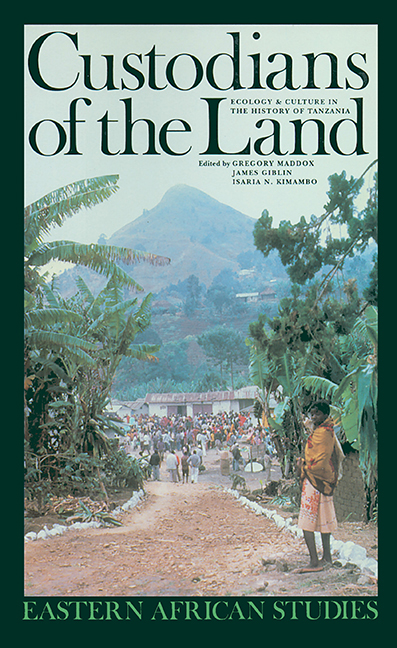Book contents
- Frontmatter
- Contents
- List of Maps, Figures & Tables
- List of Photographs
- Abbreviations
- Contributors
- Acknowledgements
- Introduction Custodians of the Land: Ecology & Culture in the History of Tanzania
- Part One Environmental & Demographic Change
- Part Two Environmental Change & Economic History: In Tanzania's Northern Highlands
- Part Three Politics & Environmental Change
- Part Four Environment & Morality
- Conclusion
- Bibliography
- Index
Part Four - Environment & Morality
Published online by Cambridge University Press: 30 August 2017
- Frontmatter
- Contents
- List of Maps, Figures & Tables
- List of Photographs
- Abbreviations
- Contributors
- Acknowledgements
- Introduction Custodians of the Land: Ecology & Culture in the History of Tanzania
- Part One Environmental & Demographic Change
- Part Two Environmental Change & Economic History: In Tanzania's Northern Highlands
- Part Three Politics & Environmental Change
- Part Four Environment & Morality
- Conclusion
- Bibliography
- Index
Summary
The chapters in this part mark a particularly innovative turn in the tradition of Tanzanian environmental history. They deal with subjects which are vital for an understanding of ecological change, but which nevertheless have been only rarely included in discussions of African environmental change. Michelle Wagner, Thomas Spear and Jamie Monson examine the thought and institutions which created a morality of resource use. They situate their studies in three very different environments, the Buha savannah of Kigoma, Mount Meru and the Kilombero Valley. Wagner devotes most of her attention to precolonial Ha culture. In contrast, Spear and Monson concentrate on the colonial period, and explore the clash of very different European and African understandings of moral resource use.
Michele Wagner offers a history of earth spirits and the priests who mediate with them. The Ha people, she says, have long identified closely with small environmental niches and with the earth spirits who inhabit them. The priests guide the use of micro-environments, teaching farmers where to plant, where to draw water and what places must be avoided. She shows that although there is great continuity in the institutions and beliefs which govern the utilization of the environment, they have passed through at least four phases. Before the eighteenth century, the priests apparently enjoyed unrivalled authority in Buha. When kingship took root in Buha during the sixteenth or seventeenth centuries, however, the priests began to share both their authority and the supervision of sites of spirit veneration with kings and their ritual specialists. Thus a close association seems to have developed between precolonial political authority and environmental control, just as it did in regions of eastern Tanzania such as Usambara, Handeni and Uluguru. The nineteenth century, argues Wagner, brought caravan trade from the Indian Ocean coast (Ujiji, the great caravan terminus on Lake Tanganyika, was located in southern Buha) and greatly inflated the value of economic knowledge. ‘Access to nature spirits’, she argues, became ‘a new kind of economic asset \ Priests took tribute in inflated amounts from coastal merchants who wanted their authorization to build trading stations, and from Ha farmers who sought security from famine, pestilence and other calamities which might expose them to enslavement. Under colonial rule, priests often obtained positions as subchiefs in the British administration.
- Type
- Chapter
- Information
- Custodians of the LandEcology and Culture in the History of Tanzania, pp. 171 - 174Publisher: Boydell & BrewerPrint publication year: 1996



